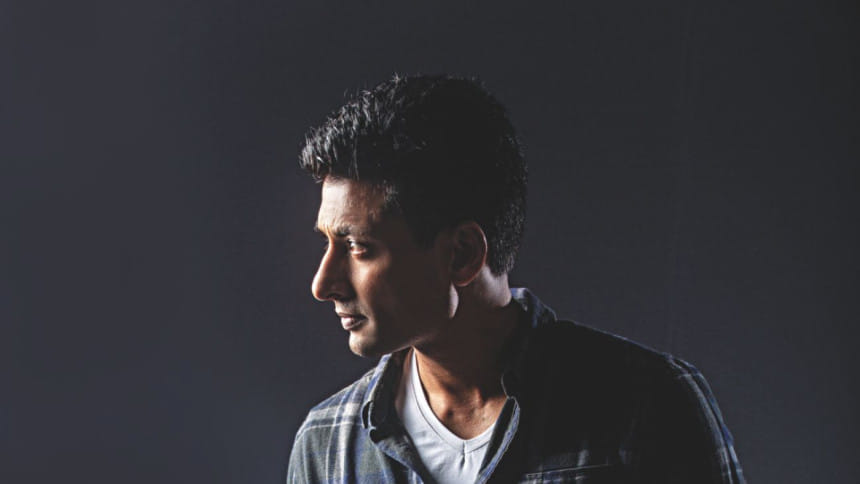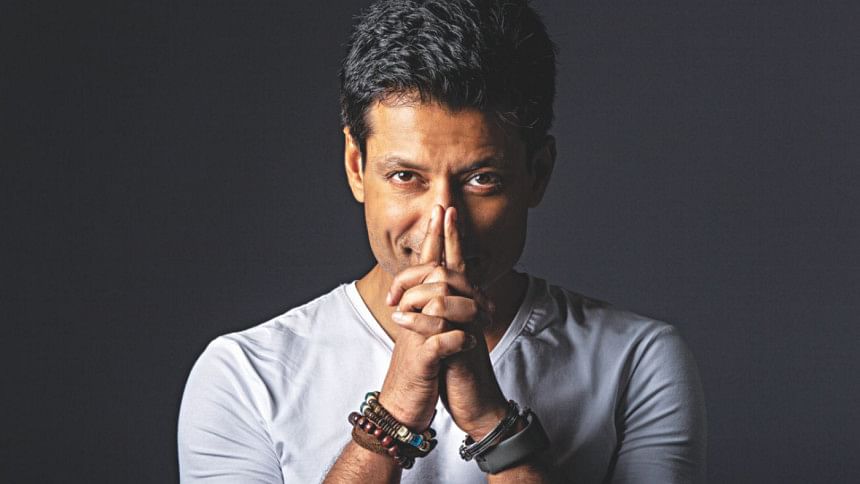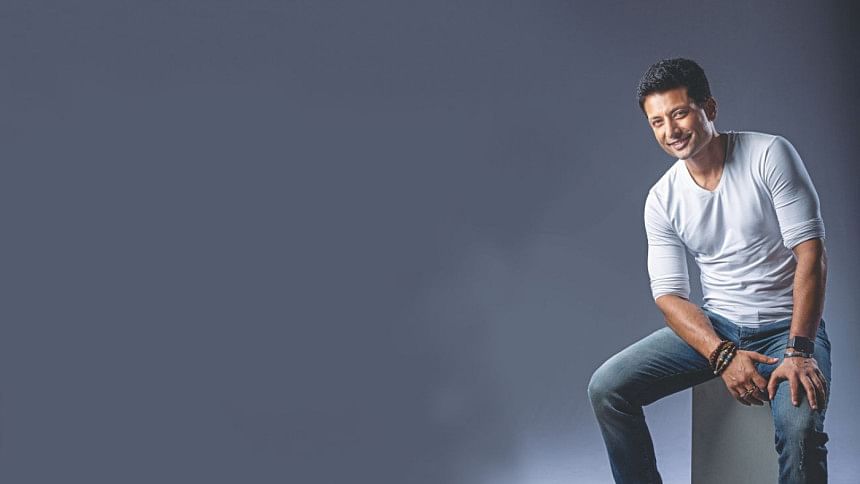Aloof & Content

Rafi Hossain: We are grateful to you, Indraneil! It is our pleasure that you have managed to find some time for us.
Indraneil Sengupta: Thank you!
Rafi: So, what is keeping you busy these days?
Indraneil: Currently we are shooting for a film called Nandini, directed by Shoebur Rahman Russell. It is being produced by Nayantara.
Rafi: You are a very famous actor of both the Bengals. Despite that, it might seem to many that your career graph did not go the way it could have gone upwards. Do you agree with this?
Indraneil: I agree with this to some extent. I used to live in Bombay and worked there. I received an offer from Buddhadev Dasgupta through which I stepped into the Bangla film industry. Shortly after, I received another offer from Kaushilk Ganguly where I could work with Rituparno Ghosh. So, my career genuinely began with the aspiration of working with such big actors, otherwise I was never destined for this. I left my career in TV productions to focus more on films, and until 2012 I worked at a stretch. But when you are working too much, the chances of making it seem dull also increases. And I think that is what exactly happened in my case. I think if I did fewer films, the career graph would somewhat seem more healthy.
Rafi: Did you wish to bring any change in your pace?
Indraneil: Yes, in fact I have been accepting fewer offers now. I have done about two or three films in the past few years. My daughter is growing up, and so now I try to spend more time with my family in Bombay. I hardly visit Kolkata, so I am not even aware of the current condition of the industry.
Rafi: How do you evaluate the current scenario of the film industry?
Indraneil: Of course, the scenario is positive. A good number of quality films have been made lately. I think every industry has its certain ins and outs. I would not go too deep into commenting on those aspects. But in Kolkata, I rather feel like an outsider. Bombay has better acceptance for artists compared to Kolkata. If you work in Kolkata, but do not live there – you will feel a different treatment. I think it is sort of the same for Dhaka as well.
Rafi: We have a good reputation for being warm and welcoming! Would you not agree to that?
Indraneil: I would definitely agree. I have been taken quite warmly in Kolkata as well by the fans.

Rafi: We have Jaya Ahsan, who is doing very well in Kolkata based films. She is also an 'outsider', if I follow your notion. How do you see that?
Indraneil: Here is the thing – I cannot work under certain conditions because of the kind of person I am. Jaya is a very good actor. She has done some amazing films. But everyone has their own preferences and style of working.
Rafi: It is a little surprising, since you started your career with such prominent directors!
Indraneil: My first few films were done under some immensely talented directors. I worked in Autograph, which was Srijit Mukherjee's career establishing work and perhaps one of the most memorable films of the industry. But I do not prefer to change or adjust myself to fit into certain situations. I am happy being the person I am.
Rafi: Is it good for your acting career?
Indraneil: Work is not always the main focus for everybody. I am content with myself; I will face what comes my way.
Rafi: How do you see the industry in Dhaka?
Indraneil: I have not done enough films to make any comment, I suppose. I have only done two films so far, the third one is in the making. My network here is very limited. I have worked with Jaya Ahsan, Shakib Khan and Apu Biswas, who have all been very nice co-artists. Overall, I have received extremely warm hospitality. The people here are genuinely cooperative, and I am not saying this just to maintain good relationships.
Rafi: What are your thoughts on your relationships with such talented directors like Rituparno Ghosh?
Indraneil: I worked with Rituparno in his last film Satyanweshi. Before that, when we were preparing for Arekti Premer Golpo, we became very good friends. But the thing is I do not consider myself to be a good people person. I hardly take my connections beyond the boundaries of professionalism. When I am done with the work, I put a full stop to it. You can say I am quite aloof as a person.
Rafi: So do you never feel like getting in touch with the previous co-artists to seek new work opportunities?
Indraneil: Absolutely not. I just do not have that quality (laughter).

Rafi: You think if they need you, they will reach you?
Indraneil: Yes, it is more like that. I mean I will only want to fit into a character, if the director can visualize me in that character. So what is the point of looking out here and there? If I am not in the director's shortlist, I can barely contribute with volunteer efforts. And some of us, like – Parambrata, Abir, Jishu – we work with a certain kind of film genre which is unique. So, I feel that the exclusive factor should be maintained. Abir and Jishu are doing a lot of films. Yet I think we four fall inside a particular bracket. Forcing any director or persuading indecently to give me a role is highly unprofessional, for me. Only once in my life I reached Sandip Ray to see if the role in Feluda was available for me. That was it.
Rafi: Your film 'Kahani' was highly appreciated. What feedback did you get afterwards?
Indraneil: Kahani was a successful movie. But interestingly, I did not receive a single offer as an outcome of that success. Except for Vidya Balan, all the other key actors were from Kolkata. It was because the plot was entirely based on the City of Joy. Every city and its people have a unique flavor. And that flavor of Kolkata was exploited in Kahani, that was just about it. Otherwise, it was not a platform where an actor could elevate their career.
Rafi: Tell us about your plans with Bangladeshi films.
Indraneil: Language, country, director, producer – these have not been in my criteria to check while planning ahead. I only evaluate the story and the scripts; if I find a role that suits my personality, I accept the offer. Previously, I have worked with Redoan Rony in Bangladesh. It was a pleasing experience.
Rafi: What keeps you occupied these days?
Indraneil: So far I have been very busy with Bombay based TV productions.
Rafi: Did you not feel any hesitation or complex going back to TV again after being so successful in movies?
Indraneil: I do not consider myself to be 'so successful' with Hindi films. I may have scored a few hits with Bangla films. But these are two very different industries with very different equations. The living cost in Bombay is very high, compared to Kolkata. If I had been doing films like Paglu, that would be a different scenario. But I do not work in that bracket.
Rafi: How do you feel about taking risks to try out new career dimensions?
Indraneil: Right now, my age is forty-four. I think I have passed the age window where I can be experimental in my approach. I have been involved with the television since 2006, and I started modelling in 2000. After this long period of time almost everyone knows about me and my caliber. So, I am in no position to introduce myself to anybody for seeking newer dimensions.
Rafi: Are you open to accepting Bangla film offers?
Indraneil: I am open for Chinese films too, if I find the script interesting. I have done a Telegu and a Marathi film as well. It was a matter of luck and coincidence that I ended up doing so many Bangla films. I loved working with Buddhadev Dasgupta and Rituparno Ghosh. I have been lucky to have worked with a batch of seasoned directors. I am yet to work with Aparna Sen, Goutam Ghosh and Raj Chakraborty.

Rafi: Tell us more about your experience of working with Rituparno Ghosh.
Indraneil: Rituparno was undoubtedly a brilliant artist to work with. I learned a lot from him. He depended largely on his cinematographer in terms of camera angles or light effects, but he was mighty strong with art direction. He was what we call an 'actor's director'. And he was tremendously knowledgeable as well. He could talk about almost everything under the sun. Rituparno would guide the actors along even when the shooting was on. There has always been a different kind of lyrical quality to his scenes. He would often say, 'My films have a rhythm!' which I hardly understood in the beginning.
Rafi: And what about his acting? You two have handled a very bold film together!
Indraneil: I only saw him acting once, that too with me in Arekti Premer Golpo. It was a very important film for my career. Rituparno embraced his roles as an actor in ways that you would find fascinating. The question was quite prevalent at that time too, whether it was Ritu's skill or Kaushik's credit. But I would say it was solely a Kaushik Ganguly film. Rituparno never interfered with the director. He may have given his opinion on art direction – say, change this curtain or that – but that was his forte so anybody would take his words in that case.
Rafi: Tell us about your experience of working in Bangladesh.
Indraneil: Almost everybody that I have met here invited me over to their house for a meal (laughter)! This is very unique, you will hardly see this in India. I think it is a very warm thing about Bangladeshi people. But as I said, my network has mostly been limited to the film related people. I have not had the chance to explore the greater part outside. Everyone in the sets, from co-artists to spot boys, has been very kind and cooperative. But one thing I can say is that the artists in Bollywood are much more punctual. I would not say it has bothered me a lot, but it was the only noticeable difference where I think people here can work on. The attitude here is somewhat relaxed.
Rafi: On a completely different note, are you a good husband?
Indraneil: I think I am. I do my calculations well. But I still am very old-school. I have many good friends, but no best friend. That is how it works for me. I try to maintain a fair relationship with everybody. I am very disciplined in life. I am a little insensitive at times. I realized that more after I got married (laughter). I think I am very simple. And I like people who are simple. I do not like arrogant and narcissistic people. I may seem arrogant to some, but I think this comes from my rigidity about my beliefs. And I do not like to watch my works because I keep trying to find my faults. I think I am a perfectionist, so I do not go too deep with self-evaluations.
Rafi: It has been wonderful talking to you, Indraneil. We wish you more success in the years to come!
Indraneil: Thank you so much. I would like to thank the audience of Bangladesh for their love and support, and request them to patronize good quality films.
Transcribed By Tasbir Iftekhar

 For all latest news, follow The Daily Star's Google News channel.
For all latest news, follow The Daily Star's Google News channel. 








Comments